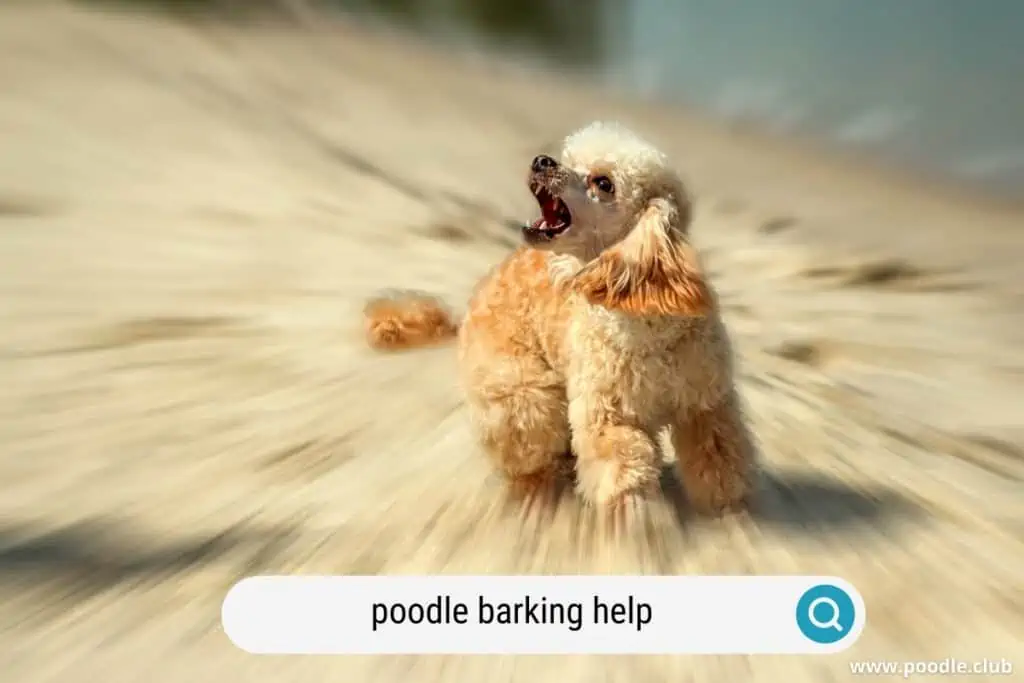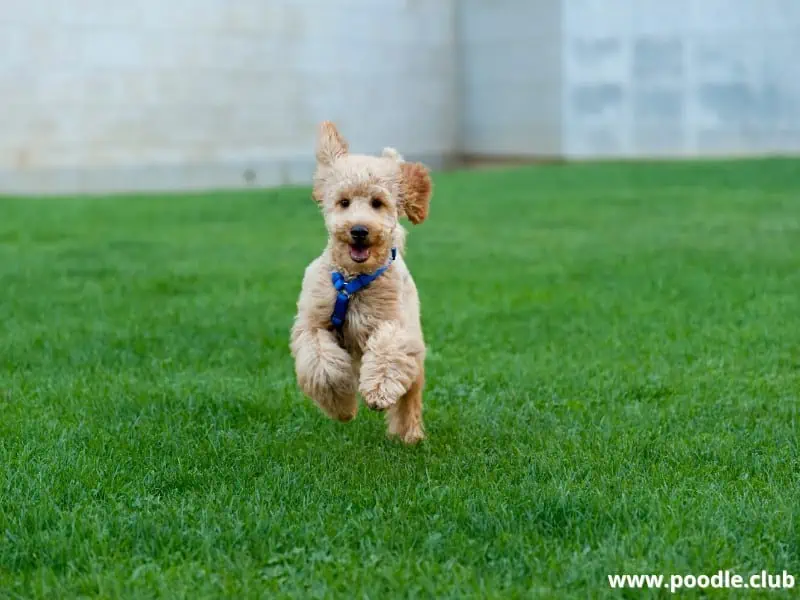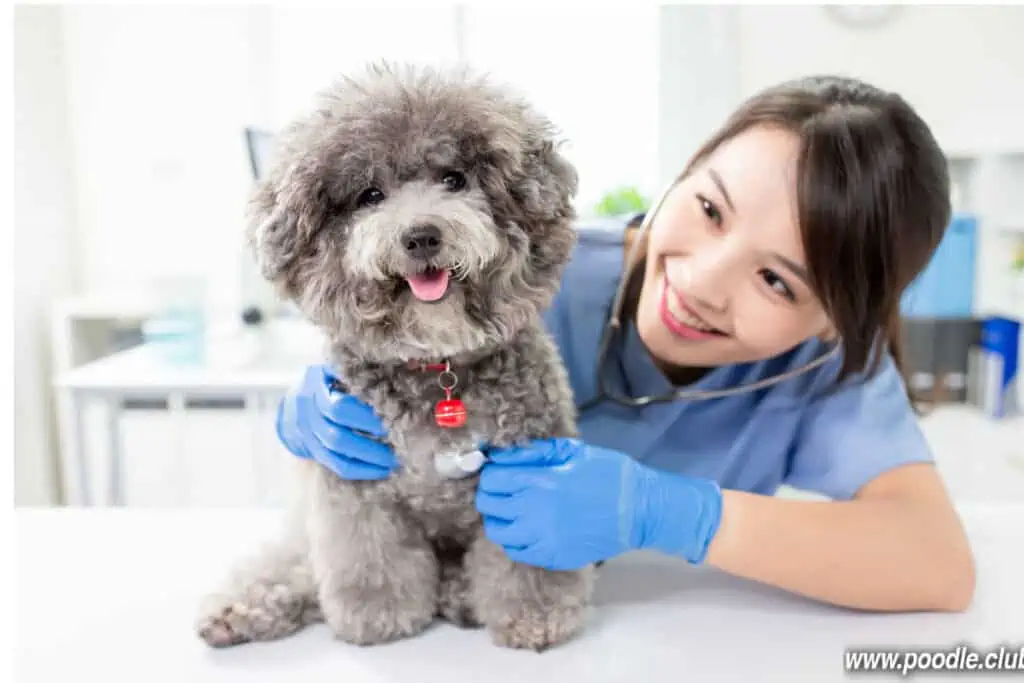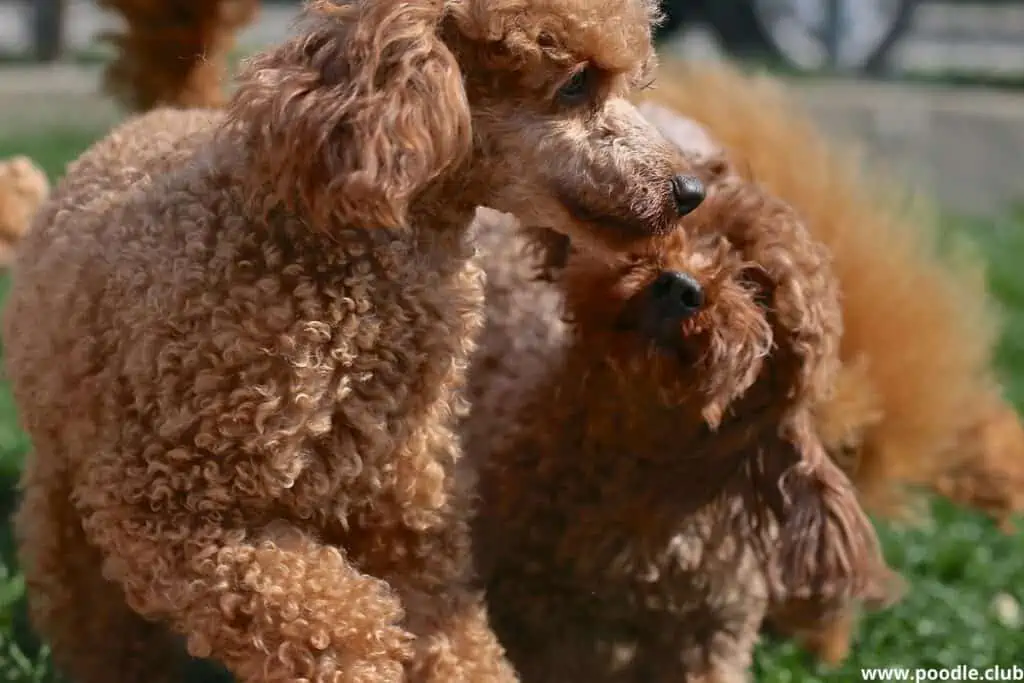Why Are Poodles So Mean? Uncovering the Truth Behind Their Behavior
Poodles are often perceived as being mean or aggressive, but it’s essential to understand that a dog’s behavior is influenced by several factors. These factors can include their temperament, upbringing, and socialization. The idea that Poodles are inherently mean is not an accurate blanket statement.
Let’s explore some of the reasons that may contribute to this perception.

One reason for this stereotype may lie in the breed’s intelligence and sensitivity. Poodles are known to be highly intelligent dogs, which can lead them to be more perceptive of their surroundings and potentially more reactive to certain stimuli. Additionally, their sensitivity might cause them to experience stress or anxiety more quickly, leading to displays of aggression as a self-defense mechanism.
Another contributing factor to the perception of Poodles as mean could be a lack of proper socialization during their early years. Socialization is crucial in shaping a dog’s behavior, and without adequate exposure to various situations and other animals, a Poodle may become fearful or aggressive. It’s essential for owners to invest time and effort into early socialization and training to ensure their Poodle develops into a well-rounded, good-natured companion.
Poodle Breed Overview

History and Origin
Ah, Poodles. These fluffy, intelligent, and sometimes misunderstood creatures actually have quite a fascinating history. Believe it or not, Poodles were originally bred in Germany as water retrievers for hunters.
However, their stylish haircuts and undeniable charm quickly caught the eye of the French, and they were soon adopted into French high society. By the way, did you know that Poodles are now considered the national dog of France? C’est magnifique!
The word “Poodle” comes from the German word “Pudel,” which means “to splash in water.” We bet you didn’t expect these curly-coated canines to have such a practical origin, given their rather posh reputation!
PuppySpot is a reputable dog marketplace where you can browse and find compatible puppies right from the comfort of your home. They have placed over 200,000 puppies into homes in the US!
Size Varieties
Poodles are versatile dogs, available in three convenient sizes for your particular lifestyle needs: the Toy, Miniature, and Standard Poodle. Fear not! Despite their size differences, all three varieties possess that unique Poodle flair.
- Toy Poodle: The smallest of the bunch, these petite pups typically weigh between 6-9 pounds and stand up to 10 inches tall at the shoulder. Perfect for snuggling up on your lap, but don’t underestimate their intelligence and agility!
- Miniature Poodle: A midpoint choice weighing in around 15-17 pounds and standing 11-15 inches tall. Miniature Poodles strike a balance between petite and practical, making them an ideal choice for many families.
- Standard Poodle: The OG of the Poodle world, these beauties can weigh anywhere from 40 to 70 pounds and stand 15-22 inches tall. Taking their lineage back to their German water retriever heritage, they are the perfect companion for an active and outdoorsy lifestyle. Plus, they make great guard dogs, too!
Now you know a bit more about our elegant and diverse friends, the Poodles. We hope this information helps you appreciate these fabulous dogs as the multifaceted canines they truly are. From humble beginnings as German water retrievers, to being adored and pampered as the national dog of France, Poodles have always made a splash, in more ways than one!
Poodle Behavior and Temperament
Poodles are often associated with an air of elegance and intelligence, but are they mean? Let’s discuss their behavior and temperament to better understand their true personality.

Factors Affecting Poodle Behavior
Poodles are a highly intelligent breed and are quick to learn, which makes them responsive to training. However, their intelligence also means that they can quickly pick up on both good and bad habits from their environment. Anxiety and fear may play a role in making a Poodle seem mean or unfriendly.
For example, if a Poodle had a negative experience with a specific type of dog or event, they might develop fear or anxiety when faced with a similar situation.
A common misconception about Poodles is that they have a mean temperament, but in reality, their seemingly snobby attitude might be due to the way they carry themselves. They are proud and poised dogs, which can sometimes be misinterpreted as being mean.
Inadequate socialization also plays a part in shaping a Poodle’s behavior. If a Poodle is not exposed to various people, animals, and experiences while it is young, it may become fearful and anxious, leading it to act out in aggression or fear.
The Importance of Socialization
Socialization is essential for all dogs, especially for highly intelligent breeds like Poodles. Proper socialization helps Poodles develop a well-rounded personality and decreases the likelihood of developing undesired behaviors like aggression, fear, or anxiety.
To socialize your Poodle, expose it to various situations, sounds, and experiences when it’s young. Introduce it to different kinds of people, animals, and environments, making sure that each interaction is positive and enjoyable. It’s important to start socializing your Poodle as early as possible to ensure it grows up to be a confident, friendly, and well-adjusted dog.
Poodles are not inherently mean dogs. Their behavior and temperament are highly influenced by factors such as socialization, experiences, and their environment. By providing a Poodle with proper socialization and a loving, supportive home, you can ensure your Poodle grows up to be a friendly, affectionate, and well-adjusted companion.
Training and Obedience
When it comes to Poodles, their intelligence and trainability are well known. However, in some cases, people might perceive these dogs to be mean. This section will discuss the importance of proper training and obedience for Poodles, focusing on methods and techniques, as well as essential puppy training.

Methods and Techniques
Poodles are highly intelligent dogs, which means they require mental stimulation to keep them engaged and happy. One effective method is to use positive reinforcement. This technique involves rewarding good behavior with treats, praise, or playtime.
For example, when teaching your Poodle to sit, you could use a treat to guide them into the desired position. Once their bottom hits the ground, reward them with a treat and praise. This will encourage your Poodle to associate sitting on command with positive experiences, making them more likely to repeat the behavior in the future.
Another technique is to incorporate training sessions into your Poodle’s daily exercise routine. This will allow your dog to exert energy while learning new skills, keeping their mind and body engaged.
Essential Puppy Training
Starting your Poodle’s training early is crucial for ensuring a well-behaved and obedient dog. Puppy training typically begins around 8 weeks of age and includes basic commands like sit, stay, and come. Properly trained puppies are less likely to exhibit behavioral problems such as aggression or anxiety later in life.
Socialization is another essential aspect of puppy training. Introducing your Poodle to a variety of new experiences, people, and other dogs will help them to develop into a confident and friendly adult dog.
Just remember, patience is key when training a Poodle puppy. These little bundles of fluff may be smart, but they don’t always catch on right away. So, keep your sessions short, engaging, and most importantly – have fun!
After all, nobody said training your Poodle to be the next doggy Einstein had to be a fetch-ing bore!
Addressing Aggression

Causes of Aggressive Behavior
One common misconception is that Poodles are inherently mean or have a higher tendency towards aggressive behavior. In fact, Poodles, like any other breed, can exhibit aggressive behaviors such as growling, barking, lunging, and even biting if not properly trained and socialized. Understanding the root causes of aggression can help in addressing these behaviors effectively.
- Fear and Anxiety: Poodles might become aggressive when they feel threatened or anxious. This can be due to their territorial instincts, protecting their owners, or simply reacting to a perceived danger.
- Lack of Socialization: Poodles that haven’t been exposed to various environments, people, and other animals during their early development may exhibit increased aggressive tendencies.
- Physical Pain: Sometimes, a Poodle’s aggression might be a result of an underlying health issue that causes them pain.
Preventing and Reducing Aggression
The key to addressing aggression in Poodles is to tackle the root causes while creating a healthy environment for your dog to thrive in. Here are some tips to prevent and reduce aggression in Poodles:
- Proper Socialization: Expose your Poodle to a variety of situations, people, and other animals from a young age to help them develop good social skills and learn how to navigate the world around them.
- Training: Enrolling your Poodle in a positive reinforcement-based training program can help you establish boundaries, teach them the appropriate behavior, and create a solid bond between you and your dog.
- Regular Exercise: A well-exercised Poodle is less likely to exhibit aggression, as they can burn off excess energy through physical activities.
- Addressing Health Issues: Regular vet check-ups can help detect potential health problems early on, preventing aggression caused by pain or discomfort.
So, instead of labeling Poodles as mean, let’s work together to create a Poodle-positive environment that addresses their needs and sets them up for success. Remember, a happy Poodle is a gentle Poodle!
Physical and Mental Needs

Exercise and Activity
Poodles are a high energy breed, originally bred as water retrievers, which means they require regular exercise and activity to stay happy and healthy. These playful and curious dogs love to run, jump, and swim, so it’s essential to provide them with diverse physical activities to prevent boredom and release their energy. A tired Poodle is a well-behaved Poodle, and ensuring sufficient exertion helps to avoid any “mean” behavior that may arise from pent-up energy.
Taking your Poodle for daily walks and engaging them in games like fetch and agility exercises can help maintain their physical well-being, reduce stress, and strengthen the bond between the two of you. But beware, if you don’t provide adequate exercise, the Poodle’s high energy may transform into exhaustion, making them cranky and more likely to misbehave.
Mental Stimulation
Poodles aren’t only physically active but also incredibly intelligent, ranking among the top smartest dog breeds. This means that mental stimulation is just as critical to their overall well-being. Ignoring their intellectual needs may lead to boredom, frustration, and, consequently, destructive or mean behavior.
To keep your Poodle mentally challenged, provide a variety of puzzles and toys designed for dogs. These activities can fulfill their innate curiosity and help prevent any potential health problems related to boredom and stress, such as anxiety or compulsive behaviors.
Teaching your Poodle new tricks is also an excellent way to provide mental stimulation. The added bonus? Your friends and family will be amazed when your dog can fetch your slippers, close cabinets, or turn off lights with just a simple command.
Who’s a smarty pants now?
In conclusion, understanding and tending to a Poodle’s physical and mental needs can help prevent any mean behavior. A well-exercised, mentally stimulated, and appropriately cared for Poodle will be more likely to remain a loving, playful, and friendly companion – living up to their reputation as “man’s best friend.”
Poodle Health and Grooming
Despite their reputation as “mean” dogs, Poodles, especially Standard Poodles, are actually quite athletic, versatile, and agile. They are even considered hypoallergenic due to their low shedding curly coat. Let’s explore some common health issues and grooming basics for these sophisticated pups.

Common Health Issues
Standard Poodles, like all breeds, may face their share of health concerns. While your Poodle could be the epitome of canine health, it’s crucial to be aware of potential issues. Some risks include hip dysplasia, progressive retinal atrophy, and epilepsy.
Providing exercise and a balanced diet can help reduce the risk of such ailments. It’s best to schedule regular vet checkups to ensure your four-legged friend stays in tip-top shape. After all, there’s no need for your Poodle to turn into a not-so-happy Doodle!
Grooming Basics
Equipped with a thick, curly coat, Poodles have a unique grooming requirement. Many owners opt for professional grooming services for the sake of convenience. However, there’s no need to break the bank as you can easily groom your Poodle at home.
Here are some basics to help you start:
- Brushing: A high-quality slicker brush is your new best friend. Gently brush your Poodle’s coat at least once a week to avoid matting and keep their curls looking luxurious. Remember, a well-groomed Poodle is a happier Poodle!
- Bathing: Poodles don’t need frequent baths. In fact, bathing them once every 4-6 weeks should suffice. Use a gentle, mild shampoo designed for canines.
- Trimming: To prevent hair from obstructing your Poodle’s vision, trim the hair around their eyes, snout, and near the ears. You can also experiment with different haircut styles such as the popular “puppy cut” or the classic “continental clip.”
- Nail Care: Maintaining your Poodle’s nails is essential for their overall health and comfort. Be sure to trim or grind their nails every 3-4 weeks to prevent discomfort or accidental scratches.
Remember, taking care of your Poodle’s health and grooming requirements improves their overall well-being and may even temper the “mean” streak they are often unjustly associated with. So, pick up that brush, trim those nails, and keep your Poodle looking (and feeling) top-notch!
Selecting and Caring for a Poodle
Poodles are known for their intelligence, agility, and occasional mean streak. Taking care of a Poodle requires attention to their specific needs, as these fluffy canines are sensitive and loyal family pets.

Finding a Reputable Breeder
When choosing a Poodle as your companion, it’s essential to go with a reputable breeder. Avoiding backyard breeders and puppy mills is key to ensuring you get a healthy, well-adjusted pup that doesn’t come with a side of attitude. Here are some tips on finding a great breeder:
- Look for breeders associated with renowned dog breed organizations.
- Ask for references from previous buyers.
- Visit the breeder’s facilities to check the living conditions of the puppies and their parents.
- Inquire about health screenings and temperament testing.
Finding a superb breeder means you’re more likely to bring home a friendly, loyal Poodle – no side-eye glares included!
Adopting from an Animal Shelter
If you prefer adopting from an animal shelter, remember that Poodles and Poodle mixes can end up in these facilities too. Here are some pointers for adopting a Poodle from a shelter:
- Be patient. Poodles are a popular dog breed, so you may have to wait a while to find the perfect four-legged friend.
- Look for animal shelters that work closely with Poodle-specific rescue organizations.
- Spend time with the dog before adopting to understand its temperament and past experiences.
- Inquire about any previous health issues or behavioral concerns.
In both cases, whether adopting from a shelter or buying from a breeder, it is essential to prioritize the Poodle’s care and well-being. Give them space to adjust to their new environment, provide opportunities for mental and physical stimulation, and shower them with love, patience, and consistency. Doing so will help you form a strong bond with your Poodle, and they’ll transform into a loving and loyal furbaby – minus the Mean Girls attitude.
Misconceptions and Tips

Common Myths
One of the common myths surrounding Poodles is that they are mean and stubborn. However, these charming dogs are often misunderstood due to their high levels of intelligence and sensitivity. While it might seem that Poodles are mean, it’s essential to remember that dogs are a product of their upbringing, environment, and genetics.
Many people assume that Poodles are born naturally mean due to their breeding. In reality, a Poodle’s temperament is influenced by many factors, including their early experiences, socialization, and training. So, blaming a specific breed for being mean is unjust and misleading.
Ensuring a Well-Behaved Poodle
To ensure that your Poodle grows up to be well-behaved and affectionate, consider the following tips:
- Socialization: From an early age, expose your Poodle to various people, environments, and sounds to help them become comfortable in different situations. A well-socialized Poodle is more likely to be friendly and confident.
- Training: Poodles are highly trainable, making it crucial to invest time and effort in positive reinforcement training. Building a strong bond, along with diligent training, will help to prevent stubborn or aggressive behavior.
- Genetics: While genetics may play a role in a Poodle’s temperament, it is not the single defining factor. When getting a Poodle, consider meeting the parents or learning about their temperament to get an insight into your future pup’s personality.
- Addressing Traumatic Experiences: If your Poodle has faced a traumatic experience, they may tend to show aggressive or mean behavior. In this case, it’s essential to work with a professional dog behaviorist to help them overcome their fears and develop trust.
- Consistency: Consistent expectations and routines can help your Poodle understand what is expected of them and make them feel more secure.
So, remember that a Poodle being mean is often the result of misunderstandings, improper training, and inadequate socialization. By following these advice, you’ll be on track to raising a lovable and well-behaved Poodle!



![Are Poodles Affectionate? [True Nature]](https://poodle.club/wp-content/uploads/2023/05/are-poodles-affectionate-768x512.webp)

![What is a Merle Poodle [Explained]](https://poodle.club/wp-content/uploads/2022/12/what-is-a-merle-poodle-768x512.webp)
![Are Poodles Fussy Eaters? [5 Fixes]](https://poodle.club/wp-content/uploads/2022/08/are-poodles-fussy-eaters-768x512.webp)
